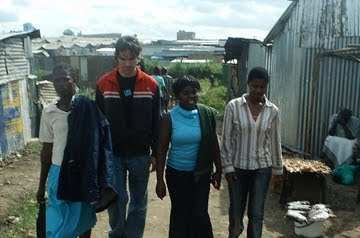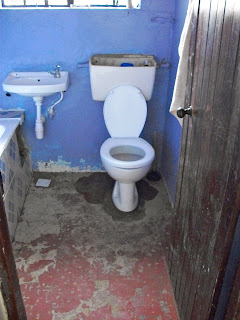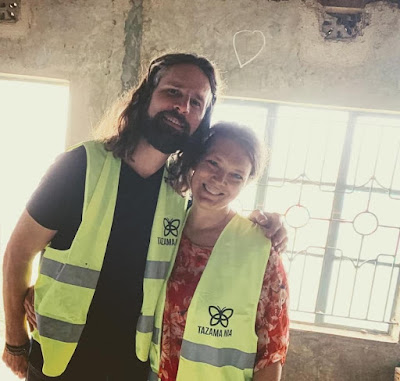The Lack of Access - A Root Cause of Poverty (5 of 8)
 |
| My first trip to Kenya - the way these three women cared for their community deeply impacted me. |
In referencing "the church," I am thinking about the global church but I also want to identify 3 different church world views. First, the local church on the ground in the informal sector. Second, the local church in the educated, middle to upper class that functions in the formal sector. And third, the partner church. A church like the second but one that also seeks to partner cross culturally with others on the ground. If you look at your own community I think you would find all three of these churches represented. Maybe not at the same disparities as in the global south but definitely outside of each other's world views.
Our work in Nairobi focuses on walking with the local church in the marginalized community (the first example). After all, in any context, the local church is by far the most equipped to reach the lost in their own community. We also invite the local middle to upper class church (the second example) to engage in the work. While their engagement is also limited by social disparities, it is not necessarily cross-cultural. There are different cultural hurdles to overcome in this context but there is enormous potential for healthy relationships, transformation and the gospel all around. Thirdly, we involve the international church as partners who understand the vision and help move it forward. Even here, if we are intentional about our approach, there is potential for transformation all around. This includes financial support, hosting visiting churches who serve on a short-term basis, and challenging individuals to have a deeper relationship with God no matter the context. Sometimes it takes a cross cultural experience to help someone get an honest reflection of their own life and spur them on to a deeper purpose. In fact, that is exactly what happened to us.
I am writing here in the context of our ministry vision, "The Pastoral Circle," which I discuss in a previous post, "Vision: the Pastoral Circle." Positioning for discipleship is at the heart of all of this. As the church, yes, we should be seeking to help the poor as a reflection of God's heart and also for the sake of our own hearts but at it's core, we do this for the sake of the Gospel, to tell the good news of Jesus. We approach poverty with our own poverty in mind.
The Church Providing Access
As the church focuses on outreach and reaching each local
community, it can gain ground by having partners or a network with organizations influencing the sectors of society. After all, laypeople are working,
representing and leading the organizations in each of these sectors. One of the church’s greatest strengths is in
leveraging our congregations, empowering them to do their own work better,
deeper. We can help laypeople understand
their calling and the daily impact for the Kingdom. This can be defined as the church providing access.
We should be empowering laypeople, commissioning the church, to impact
society and position for discipleship.
Friedman focuses on the powerlessness of the poor and
defines poverty as the lack of access of social power [1] –
the poor have little to no influence for themselves when dealing in sectors of
the state, civil society, corporate economy and political community. He goes on to suggest dimensions where the
poor can create avenues for improving their role in society: social networks,
information for self development, surplus time, instruments of work,
organizations, skills, life space, and financial resources. When the levels of these social powers are
low and the household is unable to move out of poverty on it’s own, Friedman
defines this as absolute poverty. The
assumption is that poor households lack the social power to improve the
condition of their member’s lives.
The Church: In, To and With the City
Perhaps the greatest obstacle in helping someone,
particularly in the city, move out of poverty is the fact that the majority of
life for the poor revolves around the informal social sectors of society. Life and survival depends on a society with
an informal set of rules. Everything
from, housing, buying food, finding work, banking, governance, local law and
including attending church are done from an informal worldview. One can also define this by understanding the
informality as a pure form of a rural mentality struggling to compete in an
urban setting.
One way to look at a church’s effectiveness is to assess the
level of impact by looking at it’s posture and presence within their own
community. Let’s look at three postures
of the church in their communities: the church in, to and with the city.[2]
The church may be in
the city but has failed to adapt to the changes in the community and
therefore become irrelevant. They find
themselves present but not personal. If
they don’t adapt, this church will likely die within one generation.
The church may go to
the city but finds that most of the congregation commutes from the suburbs
and is no longer present in the community, other than on Sunday morning, therefore
out of context. Many of the families may
have grown up in the church’s neighborhood. But in educating their children and
seeking a better future for them, the children have moved out in upward mobility. They attend church on
Sunday but they are now out of touch. The community views them as outsiders. Many of their friends have upwardly mobilized
themselves out of church.
What we are hoping for when we desire a better future for
our children? We might educate our
children and give them the opportunity to get great jobs; yet in the process,
unintentionally removed and upwardly mobilized out the factors of hope, faith
and the foundational relationship with Jesus.
We risk having educated but not made disciples. As the church, is education the greater
future that we hope for our children?
The church that is with
the city is incarnated with the
community – flesh and bone of the people.
They can be most effective because they can join with people in addressing the issues and transformation of the
community. When we are already present
and positioned to build relationships we avoid the dichotomy between evangelism
and discipleship. The church needs to
ensure that the laymen are committed to being with their community and building bridges that network careers to
outreach, empowering both the poor and the non-poor to know their purpose, with
a restored identity and a recovered vocation.
At the core, this is transformational for everyone. One’s faith and action is no longer only
about Sunday morning or a quarterly mercy mission. The church with the city does not just go to work
their career. It is now more deeply tied
to their identity, vocation and purpose. This church understands the great
commission and the incarnational mandate to reach others with the Gospel. The endgame becomes discipleship and how we
are positioned to do so – the task of the church.
Access
If we hope to help the church in marginalized communities move from the
informal, disenfranchised sidelines to the formal sectors of society, we must create bridges and help provide the access with formal society – fair employment, good education, formal
banking & lending, viable shopping, effective ministry and outreach and so
on.
The middle to upper class tends to believe that finances is their
greatest asset [3] -
after all, that is the greatest “ask” they hear and act on - providing this access or applying their vocation in a
practical way is possibly the greatest asset the middle to upper class has to
provide.
Lets consider an educated, middle to upper class congregation
that influences their society. The
average attenders of the church are the leaders, and participants in the sectors of society. They can range from politicians and government
leaders to business owners and directors of influential organizations. God blesses the church body and has appointed
godly people into influential roles.
As the church gets involved we want each member to be able
to say, “my love of Christ and my understanding of my faith has been deepened.”
In this season, let us reflect on this risen Savior Jesus but may this challenge us into a deeper participation in the telling of his good news.
In this season, let us reflect on this risen Savior Jesus but may this challenge us into a deeper participation in the telling of his good news.
[1] “Walking With the Poor” Myers (118)
[2] “Empowering the Poor” Robert Linthicum
[3] Funding will continue to be necessary to help the
church fulfill the demands of the needs in all areas of outreach particularly
with discipleship and getting churches planted but finances likely will not be
as great of need as providing access.

